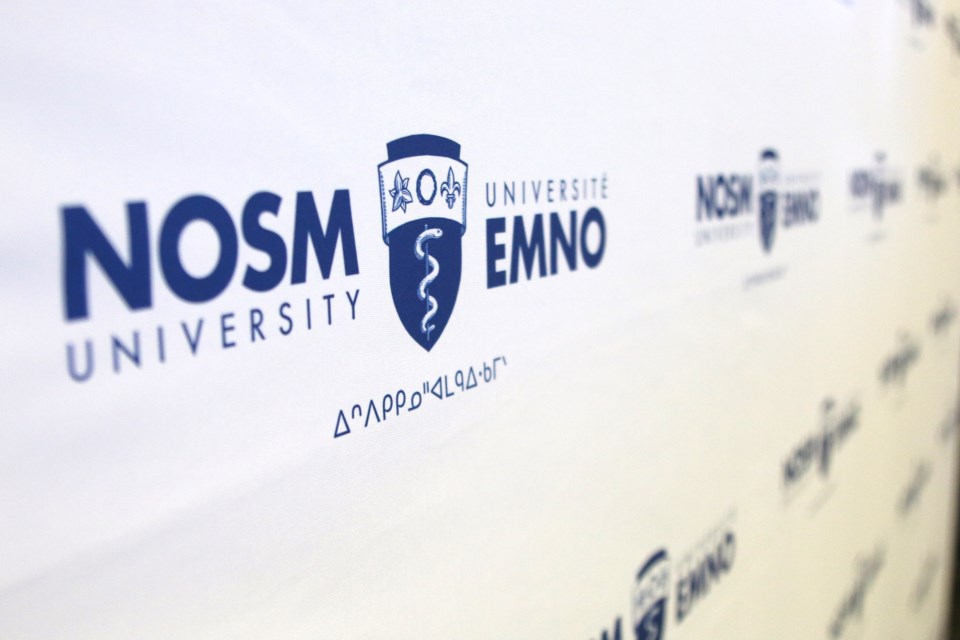THUNDER BAY - After becoming the first medical school in Northern Ontario 20 years ago, the Northern Ontario School of Medicine is celebrating another significant designation.
“It’s absolutely exhilarating and pretty amazing. For a school that was created in 2002 and started its first class in 2005, in a short 20 years it has gone from a becoming a brand-new government strategy in Northern Ontario to becoming the first independent medical university in Canada,” said Dr. Sarita Verma, president, vice-chancellor and dean of NOSM University.
NOSM celebrated the declaration on Friday, nearly a year after legislation was first passed at Queen’s Park to designate it as an independent university separate from its host institutions of Lakehead and Laurentian Universities.
“Have you ever heard of anyone making a university in less than one year? It’s pretty cool,” Verma said.
According to Verma, becoming an independent medical school will allow NOSM to pursue more research partnerships, expand class sizes, address doctor shortages in the region, and improve health care throughout the north.
“We are terribly good at what we do and what we do is actually deliver to improve the health and do research to improve discovery,” she said. “But in the end we improve the overall wellbeing of Northern Ontario.”
The provincial government also announced an expansion to medical education on Friday, which will allow NOSM to increase its enrollment by 47 per cent for medical degrees and 68 per cent in residency positions over the next five years.
Dr. Bill McCready, NOSM University senior associate dean and special advisor, said currently the school accepts 64 undergraduate students and 60 post-graduate students. With the expansion, NOSM will be able to accept 30 additional undergraduate students by 2026 and 41 additional postgraduate students by 2027.
“We are almost doubling our class size in the next five years,” he said.
McCready added that more doctors being trained in the north will mean more doctors staying in the north, which will help address growing shortages of medical professionals.
“We’ve already produced a lot of doctors for the north but we have a long way to go. Right now there is over 300 doctor shortage in Northern Ontario,” he said.
“That’s about five of our graduating classes right now so increasing numbers is really going to help and we have to get better at attracting and keeping doctors in the north and we are working on that as well.”
Taking NOSM to a fully independent university in the last year has been a long and challenging process and there is still more work to do, including electing a new board of governors, senate, as well as formalizing agreements with the former host universities, including $26 million in endowments given to the medical school through Lakehead and Laurentian.
“We are working hard to develop formal written relationships with both Lakehead and Laurentian University,” McCready said. “We are very close with Lakehead on research, faculty cross appointments, and animal care. We will be working hard on the facilities side to have a good relationship with them.”
Negotiations with Laurentian University are a little more complicated because it has recently become insolvent and all discussions must go through a court monitor.
There were also concerns that the medical school becoming an independent university could mean it leaving the city, but Verma once again reiterated that there are no plans for the school to leave the cities of Thunder Bay or Sudbury.
“Our main emphasis is going to be on the students and supporting the students,” she said. “We are committed to Thunder Bay. We are never leaving Thunder Bay. We will be based in Thunder Bay and Sudbury. We want to continue our relationships with Laurentian and Lakehead. They are kind of like our mom and dad.”
“We still want to have a strong relationship with them because they have been fantastic for us. But we will be looking to build new areas and focusses in other parts of the province because we want to expand.”
Students, staff, and faculty should see no disruption as a result of the change, though Verma said the in the near future the public should start to see some significant improvements to health care, including more family doctors and shorter wait times.
“They are going to see advanced, improved, excellent health care,” she said. “Our graduates are amongst the highest sought in the world. We have the highest pass rate in the country.”
